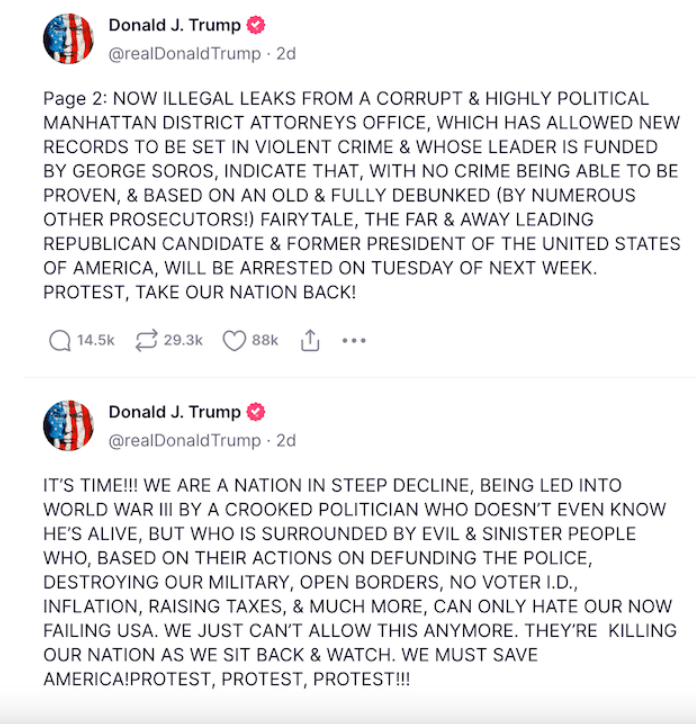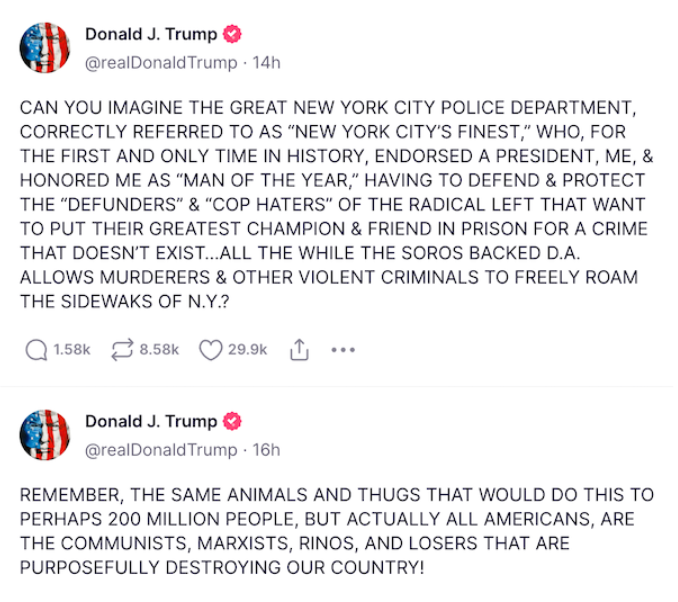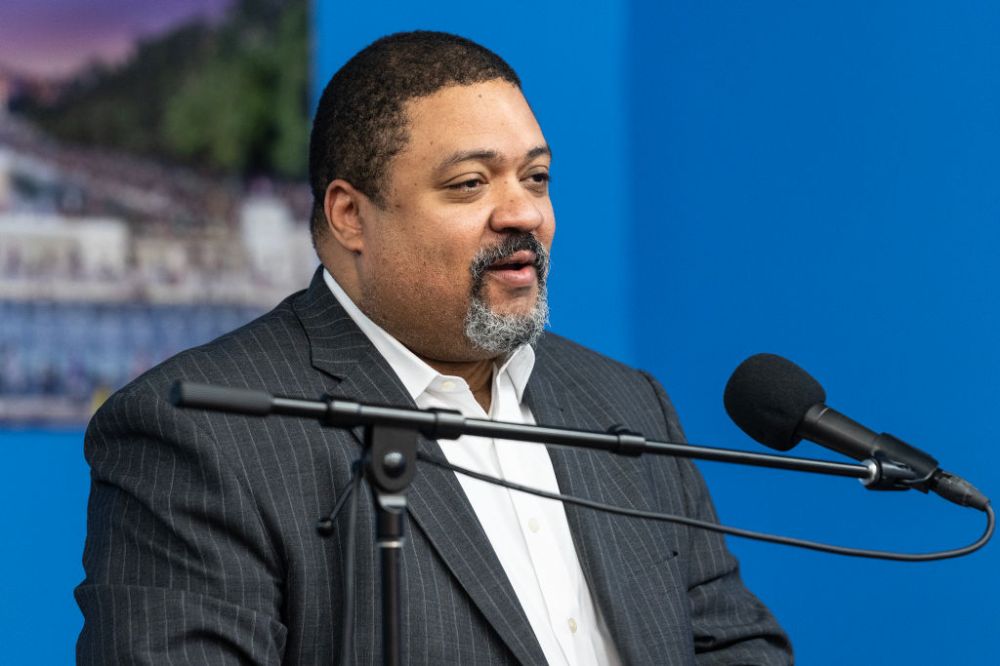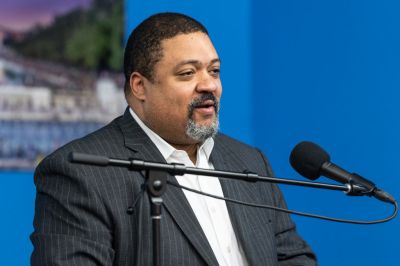One of the hazards of writing a daily newsletter is that, as political events play out, you may find you’ve already made the point you’re most eager to make.
I’m inclined to spend a few thousand words explaining why I think indicting Donald Trump for l’affaire Stormy would be a legal and political fiasco. But I can’t.
I already wrote that column.
The “too long, didn’t read” version: Manhattan District Attorney Alvin Bragg’s case relies on a questionable legal theory designed to boost a misdemeanor to a felony. Overcharging is unjust in any criminal prosecution but a reeeeeeally bad look in the case of a once and future president, when half the population is already predisposed for partisan reasons to view any charges skeptically.
It’s also ancient history. Trump made his hush-money payment to Stormy Daniels back in 2016, at the tail end of the Before Times. Bragg’s predecessor reportedly considered filing charges in the matter and opted against it. Now, seven years later, with Trump having announced his third run for president, the new Manhattan DA has concluded that it’s a fine time to revisit the matter. As much as one cringes to see Mike Pence again defend the man who nearly convinced a mob to hang him, he’s not wrong to say that Bragg’s case “reeks … of [a] political prosecution.”
Worst of all, the moral grounds are weak. Prosecuting him is morally defensible in isolation, whether on “they got Capone for tax evasion, didn’t they?” grounds or, in Kevin Williamson’s exalted formulation, because “the men and women who hold power should be held to the very highest standards of law and ethics.” But in the ever-expanding universe of Trump’s amorality, paying off a mistress is a sin so venial that Joe Biden didn’t bother to litigate it during the 2020 campaign.
And Bragg’s case isn’t playing out in isolation. Trump might soon face charges in Georgia for trying to overturn his 2020 defeat there or federal charges for having removed, then concealed, sensitive state documents upon leaving office. Either one of those cases would have much greater moral force than Stormygate since they involve his abuse of public power. The Georgia case in particular zeroes in on what makes him a singularly deplorable threat to American democracy.
Preempting those prosecutions by indicting him in New York for uncompelling reasons will color public perceptions of other charges to come, inevitably. The Georgia case could damage Trump, I think—unless the average Joe tunes it out in the belief that it’s part of a coordinated Democratic frame-up that began with Alvin Bragg trying to send him to the slammer for playing “hide the Vienna sausage” with a porn star a decade ago.
In short, it’s hard to find something encouraging to say about a case that will further complicate the already delicate matter of holding a former president accountable to the law and almost certainly will do more to shake Americans’ faith in the justice system than to restore it.
But there is one useful element to Bragg’s folly. We’re going to get some clarity from it.
Clarity about Trump. Clarity about congressional Republicans. Clarity about his most formidable challenger. And clarity about the populist base.
“I already have clarity about Trump,” you might say. “I’m a Dispatch subscriber.”
Indeed. But most Americans are not, to their shame and detriment. And so most Americans might not grasp—yet—the extent to which the former guy has grown nuttier than squirrel turds.
It’s become a cliche among Trump skeptics lately to point out how he’s decompensated, to borrow a term from psychology. Charles Cooke at National Review marveled in January that Trump seemed to be losing his grip on reality, comparing him to a “deranged hobo.” In his newsletter this morning Kevin described him as being as “crazy as a sack of ferrets.” In one of my own columns this month, I noted that his obsessive fantasy about why he lost in 2020 qualifies him as delusional, quite literally.
He’s gotten worse over time, but I don’t know how aware the average news consumer is of it. Unless you follow politics reasonably closely or have an account on Truth Social, you may be cheerfully ignorant of it.
But not for much longer. Soon the media spotlight of an arrest and indictment will focus public attention intently on the fact that the former guy now sounds, pretty routinely, like this.

Excerpts can’t do justice to how manic his ALLCAPS sh-tposting about Bragg’s investigation became over the weekend as the prospect of an arrest began to penetrate the consciousness of a man who’s lived a life without consequences. Just scroll through his feed and drink it in. The word “animals” (sorry, “ANIMALS”) features more than once. As, of course, does the idea that his fans should gather and, ahem, “protest.”
These posts deserve special attention, given the insight they provide into how a fascist sensibility reacts when it feels cornered.

Trump still has enough mental wherewithal to frame his most ominous authoritarian impulses to create a bit of plausible deniability about his intentions, but I wonder if that discipline won’t begin to break down as his immense anxiety about being arrested mounts. Today he’s calling for “protests” and wondering whether the NYPD would side with a progressive district attorney against him. Tomorrow, as his rage and fear grows, he might be more direct about wanting to see a riot in Manhattan while sympathetic cops stand back and stand by, to borrow a term.
The whole country will be watching, including swing voters who checked out of politics temporarily two years ago and might lately have found themselves wondering whether Trump has become a more responsible political leader since the … unpleasantness of his final month in office. Spoiler: He has not.
They’re going to get clarity on that. They’re going to get clarity about House Republicans, too.
Unjust prosecutions aren’t unusual in America, as any criminal defense lawyer will eagerly tell you. They would also tell you, I suspect, that practically no one is better equipped to defend himself from one than Donald Trump. He’ll have inexhaustible financial and political resources and skilled (well, well-paid) attorneys to face down a weak case. He stands a good chance of beating the rap John-Edwards-style or of being convicted of nothing worse than a misdemeanor. A botched prosecution could bring Bragg to professional or electoral ruin.
The system might very well produce a just outcome, in other words, which raises a question. Of all the injustices in American law enforcement, why is this one uniquely under urgent scrutiny by Congress? From Politico:
In the short term, Republicans are discussing firing off letters summoning employees of the Manhattan DA’s office for sworn testimony, according to a GOP official familiar with the plans. The potential request comes amid speculation about why the hush-money case was suddenly resurrected after being back-burnered by both state and federal prosecutors.
The official, who spoke on condition of anonymity because the plans are not final, noted that McCarthy, a longtime Trump ally and close friend, is “fully supportive and pushing folks to be aggressive here.”Manhattan DA ALVIN BRAGG himself is in the GOP’s crosshairs, though it’s not clear if he’ll be immediately summoned. “He should come testify before Congress,” Rep. MARJORIE TAYLOR GREENE (R-Ga.) told us and other reporters, launching into a lengthy tirade about “fake charges” meant to be “used in Democrat ads” against Trump.
It’s not just yahoos like Greene. As part of her endless ongoing tryout to be Trump’s 2024 running mate, Elise Stefanik sold one of the few remaining pieces of her soul this afternoon when she demanded that Bragg testify before the House under oath about his Stormygate probe.
I can’t think of a precedent in either party of Congress brazenly meddling in a live criminal case by looking to haul in the lead prosecutor, hoping to intimidate him into dropping the charges against a politically connected defendant. It’s more alarming to me than anything Trump posted this weekend. We already knew he was a civic menace, after all; we have, perhaps, underestimated the extent to which the House GOP is too.
Between this and Trump’s two impeachment acquittals, it seems one of the core concerns of the so-called “law and order” party in 2023 is ensuring that its leader remains legally unaccountable to the maximum possible extent. While he goes about none too subtly lobbying the NYPD on social media not to enforce the state’s criminal code against him, his lackeys in Congress are openly trying to interfere with a sovereign state’s administration of its laws.
There’ll be some clarity for swing voters in that too, in weighing which party is fit to run the federal government in 2025.
All of us, meanwhile, are about to get some clarity on Ron DeSantis.
Stormygate has left the governor in a jam twice over. Populists (mainly those already committed to Trump in the primary) are waiting to see whether he’ll go to bat for Trump against Bragg the way Mike Pence did. If DeSantis does defend him, he’ll be weakening a line of attack that otherwise plays into his “electability” pitch for the nomination. A Floridian who won reelection in November by 19 points is more likely to win a general election against Joe Biden than a Floridian who’s under indictment in New York—but perhaps it would be wrong to hold that indictment against the latter man if the prosecutor behind it is a partisan hack.
Whereas if the governor doesn’t defend Trump, he’s siding with Bragg and Soros and the Democrats in their latest “witch hunt.” For all the hype about him standing up to the left, he’ll have chosen to be a sucker rather than a fighter when it counts. His primary polling could collapse.
DeSantis stayed quiet this weekend about the looming indictment, leading numerous Trump cronies, flunkies, and other appendages to grumble opportunistically that he was unfit to lead the party. On Monday morning, the governor finally spoke up—mischievously.
He ran through the obligatory base-pleasing yadda yadda about “Soros prosecutors” but took care to mention the tawdry nature of Trump’s “porn star hush money” scandal not once but twice. (Trump responded on social media with his usual aplomb, hinting that DeSantis might be gay and/or a pedophile, while chuds like Steve Bannon whined about the governor being mean to a man who’s been attacking him viciously for months.) If an indictment is handed down, DeSantis will struggle to perfect a line of attack that simultaneously discredits Bragg’s prosecution while amplifying it as another reason Trump can’t win a general election.
That’ll tell us something about his political skills.
The second jam DeSantis finds himself in has to do with the fact that he is, after all, the governor of the state in which Trump resides. Trump’s lawyer has said he’ll surrender in Manhattan according to “normal procedures” if he’s indicted but already MAGA fans are fantasizing about some sort of standoff, with Trump holing up at Mar-a-Lago while New York demands his extradition from Florida. That would leave Gov. DeSantis in a consummate no-win situation: Either he does New York’s bidding and facilitates Trump’s extradition, destroying his credibility with right-wing populists, or he blocks the extradition request somehow and goes full outlaw, placing Trump beyond the reach of a lawful indictment.
He told the press this morning that he won’t be involved in the matter in any way, which might be the right legal answer (Article IV, Section 2!) but doesn’t solve his political problem if Trump refuses to surrender. The dregs of online MAGA influencers are clamoring for the governor to reject any arrest warrants issued by New York and to “send the Florida National Guard to Mar-a-Lago to ensure Trump’s protection,” or at least to conduct a review under Florida law to ensure that the charges are lawful, whatever that means in this case.
There’s even some idle chatter about Trump fanatics forming a, er, “patriot moat” around Mar-a-Lago to prevent law enforcement from entering. What would DeSantis do if Trump resolves to hole up at home for a while and the MAGA populists whom the governor is trying to woo decide Florida police will need to go through them physically to reach their idol?
Most of the people making these demands of DeSantis are already behind Trump in the primary and are simply looking for excuses to turn undecided populists against the governor. They’re following the first commandment of the MAGA moral universe, in which every consequence Trump faces for his own corruption is ultimately attributable to the weakness or corruption of some enemy. Even so, if Trump opts not to go quietly, the governor will have a political problem, fairly or not. The last question a populist Republican eyeing higher office ever wants to have to answer is “Trump or the Constitution?”
How DeSantis handles it will give us some clarity on his acumen as a retail politician.
We are, finally, about to get clarity on the state of the Republican base.
In the near term, that clarity will have to do with whether the insurrection was a one-off or whether Trump can summon a riot at will whenever his blood pressure spikes. I suspect the NYPD is worried about more than just “protests” in setting up barricades outside the criminal courthouse in Manhattan today.
Republican politicians are worried too. “I don’t think people should protest this, no,” said Kevin McCarthy on Sunday while insisting absurdly that Trump’s many pleas on Truth Social for his fans to “PROTEST!” weren’t to be taken literally. Figures as centrist as Chris Sununu and as fringey as Marjorie Taylor Greene also discouraged MAGA fans from demonstrating, no doubt fearing what could happen and how it would reflect on the party.
Greene reasoned that any mass demonstrations would be ripe for infiltration by “feds” bent on instigating unruliness to discredit America’s great MAGA patriots, as happened that one time. Other populists grumbled that because Trump hasn’t done a thing to help the January 6 defendants no one should feel obliged to demonstrate on his behalf this time. Whether any of these arguments are in earnest or are simply a matter of influencers framing the case against rioting in terms more likely to persuade Trump’s most excitable fans is debatable. (Someone credulous enough to believe in QAnon must be credulous enough to believe the insurrection was the product of “feds.”) What no one denies, however, is that the risk of violence is real. No one scoffs anymore at the suggestion that Trump not getting his way on something important might lead to people dying.
And no one—almost no one, rather—in this evangelical-heavy “party of values” seems terribly bothered that Trump very likely did cheat on his wife with a porn star before paying her under the table to keep quiet about it.
On that note, we’re also about to get some longer-term clarity about Republican voters.
I do not share the hot-take insta-consensus that Trump being prosecuted will be good for him politically. Last summer we were told that the FBI’s search of Mar-a-Lago would all but assure him a third nomination. It hasn’t. Now we’re told that watching prosecutors in Manhattan and, possibly, Washington and Georgia pile more electoral baggage on him will redound to the benefit of Trump instead of to the “electability” candidate in the field, DeSantis.
“Look, at the end, being indicted never helps anybody. It's not a help,” Chris Christie said on Sunday. That’s plainly true in a general election, and being true, it should prove a burden to Trump in the primary rather than a boon. Swing voters will spend the next year marinating in the legal and moral chaos that surrounds him, punctuated by sporadic proto-fascist grunts about “animals” and “retribution,” and conclude: We cannot do this again.
In order to sleep at night, I need to believe that there are more Republican voters than not who’ll also be marinating in that chaos and conclude: Yeah, not again. Once was enough.
I’m not saying I do believe it. I’m saying I need to believe it.
And even if I’m wrong, there may at least be more Republican voters than not who’ll conclude: I’m fine with doing this again, but if swing voters aren’t then we have no choice but to nominate the other guy.
I need to believe it. But if the base of this party drinks in another year of decompensating Trump madness and decides that he’s still the guy for them, what conclusions of our own should we draw about the modern American right’s fitness to govern?
Kevin Williamson ended his newsletter today by recalling Hillary Clinton’s most infamous remark from the 2016 campaign. “If all this isn’t deplorable, what is?” he said with exasperation at Trump’s nascent attempt to crank up Insurrection 2.0. I’ve been thinking lately about Clinton’s comment too, watching support for you-know-who remain stubbornly high despite DeSantis’ best efforts to cut into it. “You could put half of Trump’s supporters into what I call the basket of deplorables,” Clinton said at the time, perhaps charitably. We’ll know in a year whether she lowballed it.







Please note that we at The Dispatch hold ourselves, our work, and our commenters to a higher standard than other places on the internet. We welcome comments that foster genuine debate or discussion—including comments critical of us or our work—but responses that include ad hominem attacks on fellow Dispatch members or are intended to stoke fear and anger may be moderated.
With your membership, you only have the ability to comment on The Morning Dispatch articles. Consider upgrading to join the conversation everywhere.